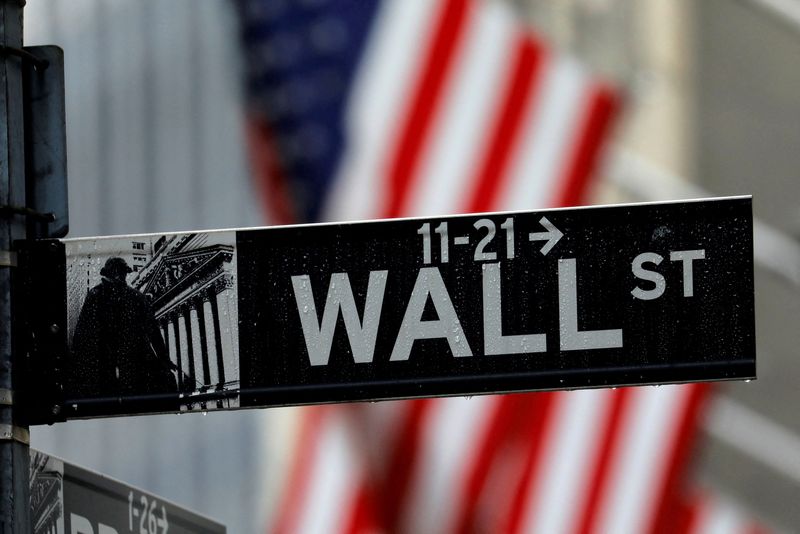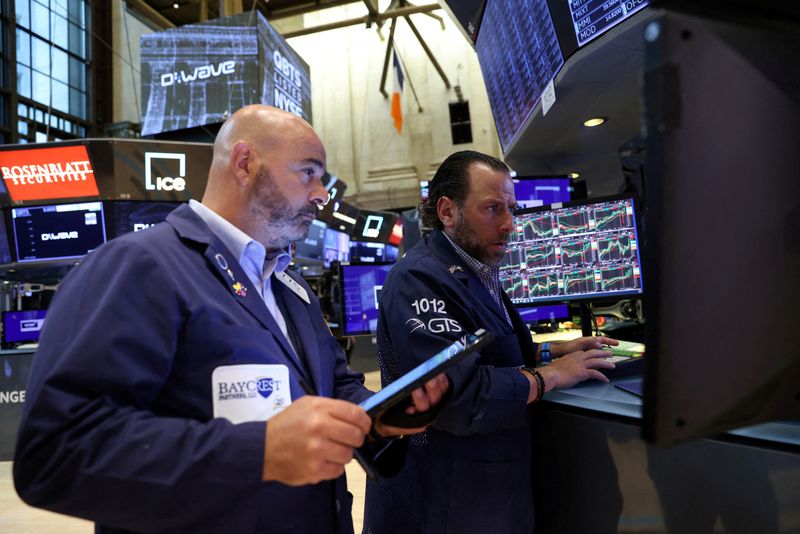By Herbert Lash and Bansari Mayur Kamdar
NEW YORK (Reuters) - Wall Street closed higher on Friday as signs that inflation may have peaked in July increased investor confidence that a bull market could be under way and spurred the S&P 500 and the Nasdaq to post their fourth straight week of gains.
The S&P 500 is up 17.7% from a mid-June low, with the latest gains coming from data this week showing a slower-than-expected rise in the consumer price index and a surprise drop in producer prices last month.
The S&P 500 crossed a closely watched technical level of 4,231 points, indicating the benchmark index has recouped half its losses since tumbling from the all-time peak in January. A 50% retracement for some signals a bull market.
Graphic: U.S. Inflation: Past its peak?, https://graphics.reuters.com/USA-ECONOMY/INFLATION/zdvxozxmlpx/chart.png
"It's really just a number, but it certainly makes investors feel better - at least those who bought near the bottom," said Tim Ghriskey, chief investment strategist at Inverness Counsel in New York.
"I wouldn't declare victory over this bear market yet. There's likely some bad news still out there. But there's a very good chance we've seen the bottom."
The Dow Jones Industrial Average rose 424.38 points, or 1.27%, to 33,761.05, while the S&P 500 gained 72.88 points, or 1.73%, to 4,280.15 and the Nasdaq Composite added 267.27 points, or 2.09%, to 13,047.19.
For the week, the S&P 500 added 3.25%, the Dow rose 2.92% and the Nasdaq gained 3.8%.
Volume on U.S. exchanges was 9.99 billion shares, compared with the 11.04 billion average for the full session over the last 20 trading days.
As the S&P 500 and Nasdaq posted their longest weekly winning streaks since November, analysts noted the Federal Reserve still has its work cut out as it seeks to tame inflation by aggressively raising interest rates without sparking a recession.
"Markets certainly got great news this week on inflation," said Dec Mullarkey, managing director of investment strategy and asset allocation at SLC Management in Boston.
"A victory lap in some respects was in order, but it's not 'mission accomplished' by any means. It's still a very slow grind ahead."
Inflation by year-end might decelerate to 7% or a bit lower, but getting core inflation under 4%, which is double the Fed's target, will be tougher than markets anticipate, Mullarkey said.
Traders are pricing in a less hawkish Fed, with fed fund futures showing a 55.5% chance of Fed policymakers raising rates by 50 basis points when they meet in September, instead of 75 basis points. [FEDWATCH]
It was a sea of green on Wall Street for a second straight day, with all 11 major S&P 500 sectors rising, along with semiconductors, small caps and Dow transports. Growth stocks rose 2.1%, while value advanced 1.4%.
Investors bought $7.1 billion in equities in the week to Wednesday, according to a Bank of America (NYSE:BAC) note, with U.S. growth stocks recording their largest weekly inflow since December last year.
Also driving optimism was data showing U.S. consumer sentiment ticked further up in August from a record low this summer and American households' near-term outlook for inflation eased again on softening gasoline prices.
After a rough start to the year, better-than-expected second-quarter earnings from Corporate America have supported the upbeat sentiment for U.S. equities.
Analysts in aggregate believe the S&P 500 posted year-over-year earnings growth of 9.7% in the April to June period, much stronger than the 5.6% predicted at quarter-end, per Refinitiv.
Banks rose 1.4% to extend their rally for a sixth straight week.
GlobalFoundries Inc jumped 11.9% on being added to BofA Global Research's "U.S. 1 list."

Advancing issues outnumbered declining ones on the NYSE by a 4.43-to-1 ratio; on Nasdaq, a 2.76-to-1 ratio favored advancers.
The S&P 500 posted five new 52-week highs and 29 new lows; the Nasdaq Composite recorded 78 new highs and 39 new lows.
